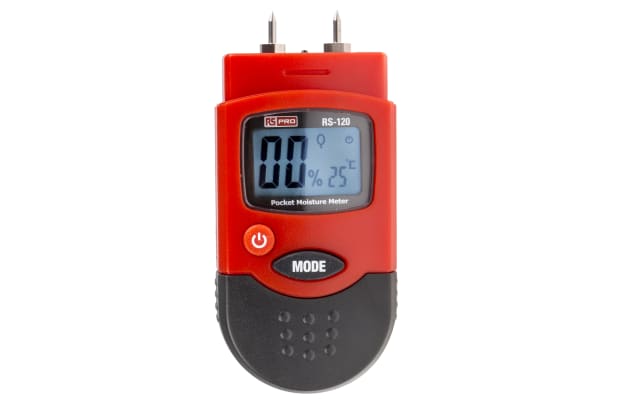Recognizing the Different Types of Moisture Meters and Their Applications
Wiki Article
The Ultimate Guide to Moisture Meters: A Comprehensive Introduction and Exactly How They Can Save You Cash
In the realm of structure maintenance, construction, and numerous sectors, the importance of properly measuring dampness degrees can not be overstated. Dampness meters work as essential devices in finding and keeping an eye on moisture content in materials, aiding in stopping pricey problems and ensuring the high quality of products. Comprehending the subtleties of different sorts of dampness meters, their applications, and the possible cost-saving advantages they use can be a game-changer for professionals and companies alike. Uncovering how these gadgets can not only simplify procedures however likewise add to financial savings is a trip worth beginning on.Types of Moisture Meters
One usual type is the pin-type moisture meter, which gauges the electrical resistance between 2 pins inserted into a material. Pinless dampness meters, on the other hand, usage electro-magnetic sensor plates to scan a bigger location without triggering damages to the product's surface.
Additionally, there are also specialty wetness meters designed for particular products like soil, grain, or hay. These meters provide precise dampness analyses tailored to the distinct homes of the material being tested. Infrared moisture meters measure the thermal residential properties of a material to establish its dampness material non-invasively, making them beneficial for applications where pin or pinless meters may not be ideal. Understanding the different sorts of wetness meters offered can assist markets pick the most ideal device for their particular dampness measurement demands.

Benefits of Utilizing Moisture Meters
Dampness meters use vital benefits in precisely keeping an eye on and examining dampness levels in diverse materials and settings (Moisture Meter). One of the main benefits of using moisture meters is the prevention of prospective damage triggered by excess moisture. By detecting and resolving high dampness levels early on, moisture meters aid to stop mold and mildew growth, rot, and architectural damages in structures, conserving both money and time on repair services. In addition, wetness meters help in guaranteeing the top quality of materials during building or production processes. By properly determining dampness material, these devices assist maintain the honesty of timber, drywall, concrete, and various other materials, minimizing the danger of issues or failings.
Furthermore, utilizing dampness meters can result in raised power effectiveness. By identifying locations with high dampness levels, such as leaks or poor insulation, adjustments can be made to improve power conservation and lower energy prices. In farming setups, wetness meters play a vital function in optimizing crop yields by allowing farmers to keep track of soil dampness levels and make notified irrigation decisions. Overall, the advantages of making use of dampness meters extend throughout different industries, providing affordable remedies my review here and advertising far better quality control practices.
How to Select the Right Dampness Meter
When choosing a moisture meter, it's crucial to ensure that the meter is ideal for the particular material you will certainly be screening. Various materials have differing electric residential properties that can affect dampness analyses, so choosing a meter created for your material is important for precise outcomes. By thoroughly examining these elements, you can pick a moisture meter that meets your needs and offers accurate moisture dimensions for your jobs.Correct Techniques for Dampness Meter Use

Price Financial Savings With Wetness Meter Applications
How can the calculated utilization of dampness meters lead to significant expense financial savings throughout different sectors? Moisture meters play an important function in cost savings by stopping possible damage and guaranteeing top quality control in different fields. In the agriculture industry, moisture meters help in establishing the ideal time for harvesting plants, avoiding over-drying or excess wetness that can affect the end product's top quality. This specific surveillance assists farmers stay clear of unnecessary losses and maximize their yield.
Similarly, in construction, moisture meters assist avoid expensive damages by detecting moisture degrees in building materials, such as timber or concrete, which can lead to structural concerns otherwise addressed promptly. By identifying issue areas at an early stage, Click This Link contractors can take restorative measures to avoid considerable fixings or substitutes, eventually conserving time and cash.
In addition, in the food handling sector, dampness meters are important for monitoring item top quality and making certain conformity with security regulations. By properly determining wetness content in food products, producers can protect against perishing, preserve quality, and reduce waste, leading to substantial cost savings. In general, the critical application of wetness meters is an important investment that can result in considerable cost reductions and improved performance across various industries.
Final Thought
In final thought, wetness meters are important tools for finding and determining dampness degrees in various products. By utilizing the right wetness meter and adhering to appropriate techniques, customers can efficiently protect against pricey damages created by excess dampness. Purchasing a quality wetness meter can result in substantial expense financial savings over time by recognizing possible issues early on and enabling prompt remediation. Inevitably, wetness meters are important instruments for keeping the integrity and longevity of materials and structures.Wetness meters offer as vital tools in finding and monitoring moisture material in materials, helping in avoiding expensive damages and making sure the top quality of products. Infrared moisture meters gauge the thermal residential properties of a product to determine its wetness material non-invasively, making them beneficial for applications where pin or pinless meters might not be suitable.Moisture meters supply invaluable advantages in accurately examining and keeping an eye on moisture levels in diverse materials and settings. In farming setups, wetness meters play a critical duty in optimizing crop returns by allowing farmers to keep track of dirt wetness levels and make notified watering decisions.In conclusion, wetness meters are beneficial tools for measuring and identifying moisture degrees in numerous products.
Report this wiki page